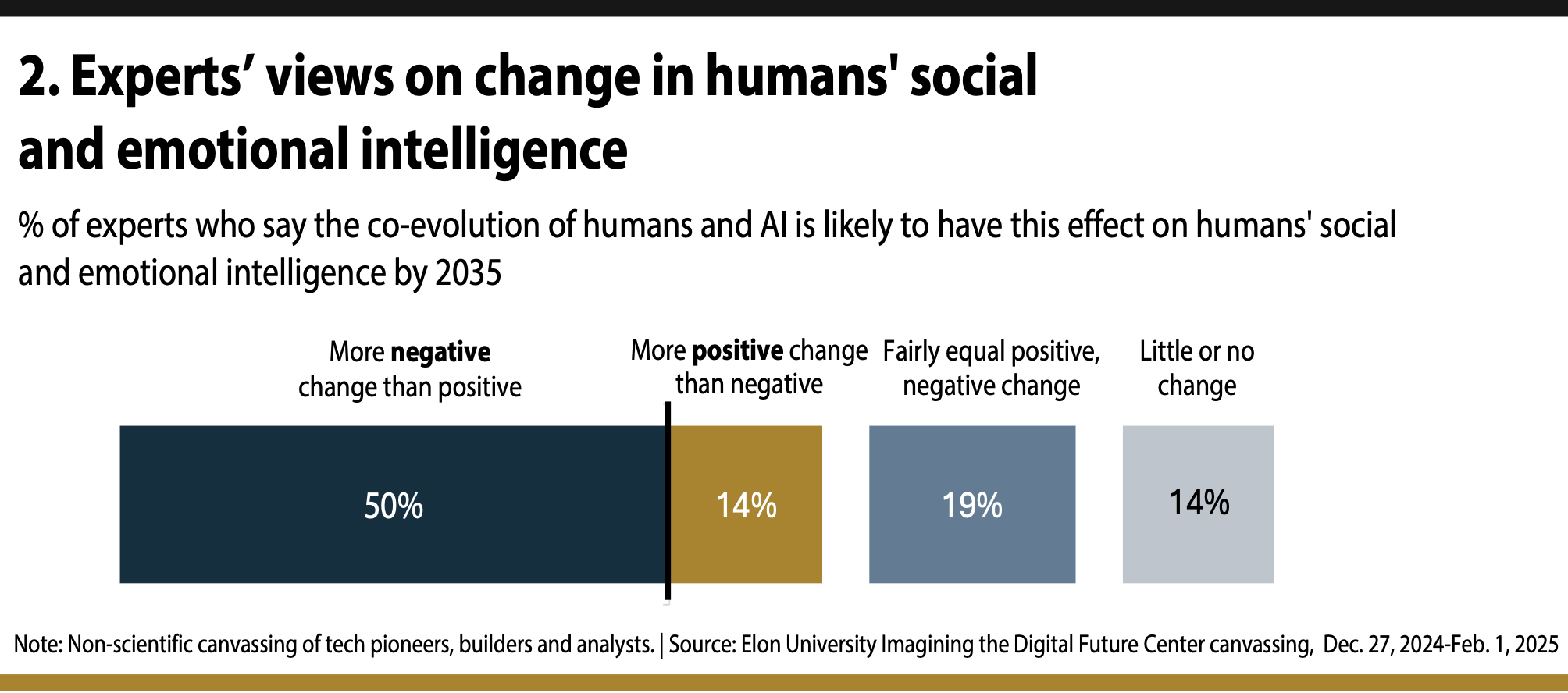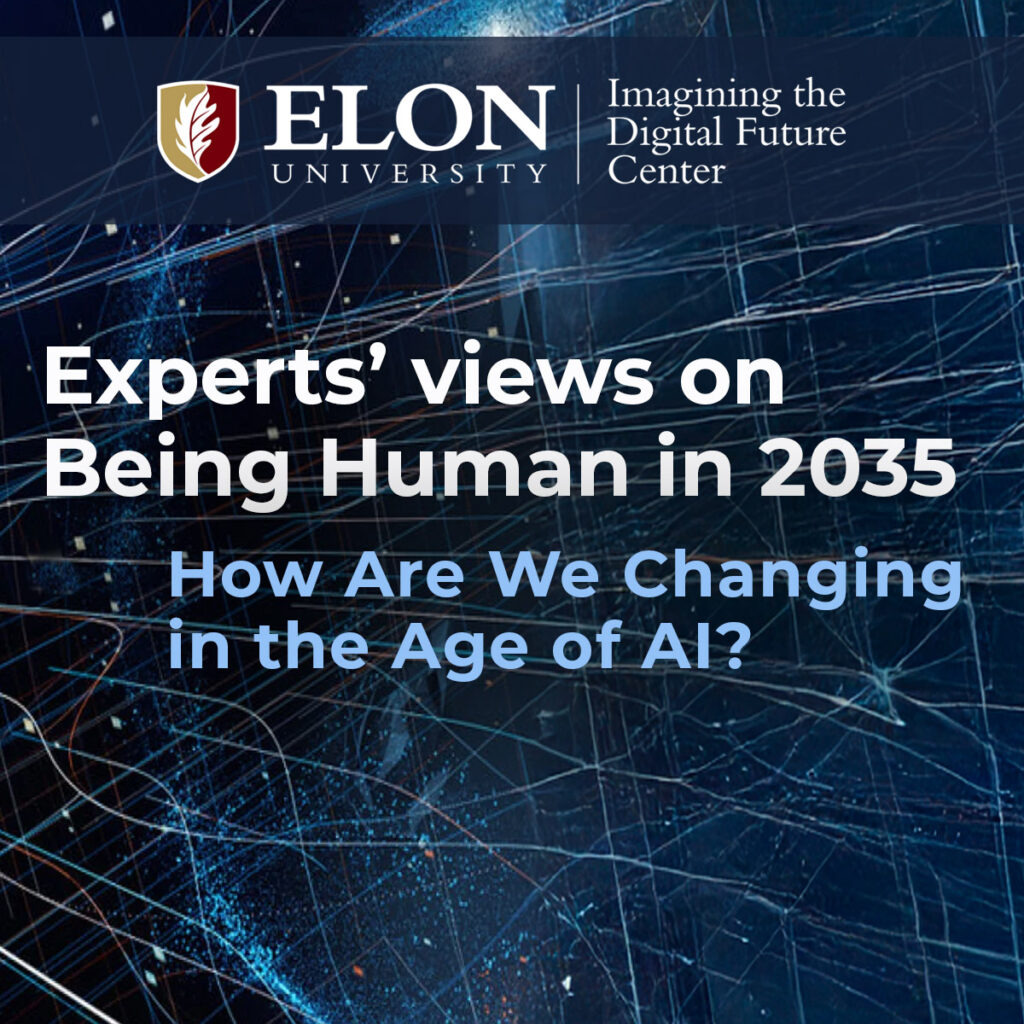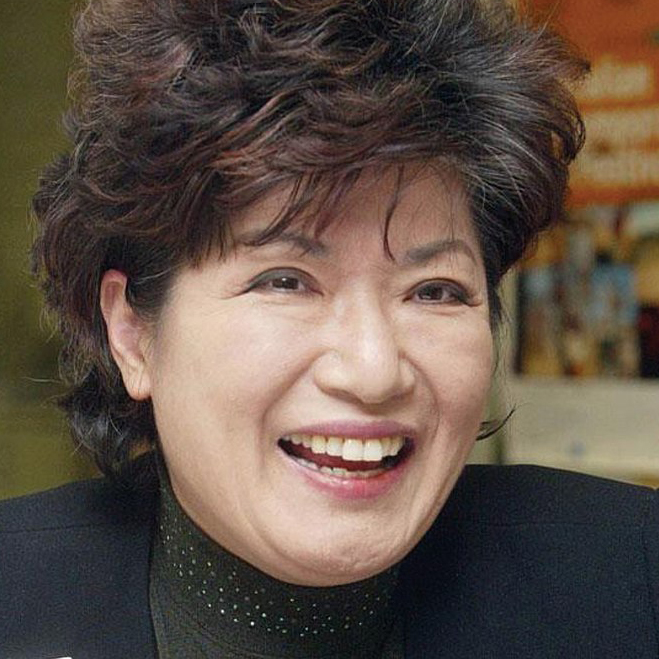

These experts expected in 2025 that by 2035 there will be…
50% – More negative change than positive change
14% – More positive change than negative change
19% – Fairly equal positive and negative change
14% – Little to no change
Few of the respondents to this canvassing offered unqualifiedly positive predictions about AIs’ impact on social and emotional intelligence. Many are concerned about AI-driven interactions replacing or dramatically altering human-to-human emotional bonds. They say people may become less adept at reading social cues, expressing emotions effectively and being willing to engage with others in what can sometimes be messy or complicated interpersonal relationships. Some even predict that many humans will prefer AIs as life partners. They wonder why a human would maintain a reciprocal relationship with another person, which might require constant work, when a perfectly attuned and unneedy “synthete” is available.
A selection of related quotes extracted from these experts’ longer essays:

“Interacting with a ‘real’ human will likely become the privilege of the wealth-management set, amplifying the sense that day-to-day life, from medicine to finance, is governed by robots, removing the key component of a sense of agency in psychological well-being. The availability of ‘Her’-like substitutes for human interaction may well further weaken the social muscle of many, feeding the epidemic of loneliness, particularly among teenagers and young adults. AI is more ‘efficient’ than human interaction, with fewer disappointments than online dating, but who will proudly look back on a 25-year marriage with a bot? Bots do not require, foster or reciprocate real-life temperance, charity, diligence, kindness, patience and humility. Indeed, they will likely tolerate and thus encourage self-centeredness and impatience. If we cannot live without bots, can they be turned into ‘training wheels’ or the equivalent of treadmills at the gym, improving our social interaction fitness?” – Henning Schulzrinne, Internet Hall of Fame member and former co-chair of the Internet Technical Committee of the IEEE

“It’s likely that the near future will see more of us recomposing our identities around virtual personalities. … Some humans are already ‘cloning themselves’ into online AIs that can represent them at scale, for example, in order to respond to thousands of follower messages on social platforms. … Humans’ immersion in these virtual experiences in encounters with deepened game mechanics and lifelike virtual characters will further blur relationships, reshape socialization and erode what it means to be uniquely human. Competition and individualism can also be amplified by frontier AI, empowering some humans to be more capable in their pursuits. We could see more hyper-empowered individuals able to act in much higher orders with the help of the best models – including models that may or may not be ‘legal.’ Sociopathy could be fostered and reinforced in some individuals working closely with a nigh-omnipotent AI companion toward self-serving goals. Goal-seeking behaviors in general will be amplified by AI, for good and ill. There are already emerging challenges with criminal networks using AI to impersonate loved ones and make demands for ransoms, again showing both the duality of empowerment and the fading uniqueness of being human.” – Chris Arkenberg, senior research manager at Deloitte’s Center for Technology, Media and Telecommunication

“AI may hasten the fragmentation of human connection. Society has long been shifting away from its kinship-based foundations – structures that prioritized interpersonal relationships, shared ancestry and mutual support. These traditional systems, while flawed and discriminatory in many ways, cultivated a sense of meaning in being with others. Modernity replaced these norms with function-based systems. Markets, schools and bureaucracies now reward merit, skill and utility over inherited social roles. While this shift brought advancements, it also redefined kinship as nepotism and friendship as cronyism. Modern organizations, in the end, have no value or need for kinship. AI, with its ability to optimize and automate, aligns perfectly with this trajectory, reinforcing function over feeling and utility over unity. … Can we imagine a future in which connection and care are as important as growth and function? Or will humanity’s pursuit of progress leave us lonelier and more fractured on a burning planet?” – A. Aneesh, sociologist of globalization, labor and technology at the University of Oregon

“[In 2035] after work, which is still the standard 8-hour day augmented by constant availability through your devices and always-on AI agents, you check your dating and companionship apps … People outsource their interactions to AI agents, which are left to determine compatibility and determine whether it’s even worth meeting up in person. AI chatbots provide constant ‘companionship’ even as the loneliness epidemic intensifies and we wonder how independent their suggestions and ideas are. To what extent are our AI companions’ recommendations based on corporate sponsorship or political manipulation? We don’t know. … Children growing up in this environment will develop different social skills than previous generations, as with the social media generation, becoming fluent in human-AI interaction but struggling with spontaneous human connection.” – Courtney C. Radsch, director of the Center for Journalism & Liberty at the Open Markets Institute

“In 2035, our social intelligence expands beyond human-to-human interaction to encompass awareness of all living systems. AI translation of animal communication and ecological patterns helps us develop planetary empathy – the ability to understand and respond to the needs of the entire living world. This evolutional leap in consciousness reshapes our understanding of what it means to be human.” – Dana Klisanin, psychologist, futurist, co-founder of ReWilding Lab and director of the Center for Conscious Creativity’s MindLab

“The next decade will witness exponential growth in AI capabilities, leading to more-sophisticated autonomous systems. In education, AI-powered personalized learning platforms will tailor instruction to each student’s unique needs and pace. AI tutors will provide instant feedback and support, freeing up human teachers to focus on fostering creativity, critical thinking and social-emotional skills.” – Youngsook Park, CEO at Almindbot, futurist and chair of the Korean Node of The Millennium Project


